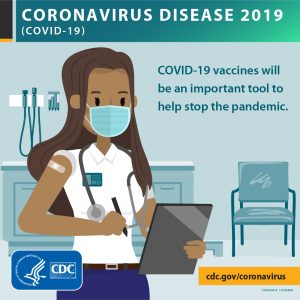 As the COVID-19 vaccines are approved for use and begin to be given to Americans and others, PHI has begun receiving questions from our constituents. Remember our knowledge about the COVID-19 virus is only about one year old and is continually being updated which means information and recommendations sometime change from month to month. Your primary care physician, especially one that has worked with you for some time, is the best source of information of what will be recommended for YOU and your particular situation.
As the COVID-19 vaccines are approved for use and begin to be given to Americans and others, PHI has begun receiving questions from our constituents. Remember our knowledge about the COVID-19 virus is only about one year old and is continually being updated which means information and recommendations sometime change from month to month. Your primary care physician, especially one that has worked with you for some time, is the best source of information of what will be recommended for YOU and your particular situation.
At this time, December 2020, here is how our Medical Advisory Committee is responding to these questions:
Does having had polio or having received the polio vaccine give immunity to COVID-19? There has been a “theory” circulating that recent expose to some viral diseases or vaccines to those viral diseases might “boost” the immune system and provide some protection against COVID-19 but that is not backed by any clinical evidence. (If a history of receiving the polio vaccine did provide protection against COVID-19, then the older people living in the developed world, most of whom have been immunized against polio, would have a very low incidence of novel coronavirus infections, and that is clearly not the case!)
Will I be given priority because I had polio? No, a history of polio does not in itself make a person more likely to get COVID-19 or get sicker than others of similar age and other medical conditions. So, a history of polio and/or PPS does not move an individual up the priority list. On the other hand, most people who contracted polio in the United States or Canada are over age 65 and several even over 80 years old. Therefore, they are already in the “high risk” group, which generally places them in the second tier of people slated to be offered the vaccine. Polio survivors with respiratory compromise may rise up one level over others of a similar age group due to their underlying respiratory condition; likewise for the polio survivor living in a nursing home or other senior living situation. In the US, each state, with input from the national health authorities, determined their own priority list, so where you fall in the priority tier system may vary slightly from state to state.
After I get the vaccine, even the first dose, can I stop with all these “precautions”? We don’t know all the particulars, but studies have shown less than 50% immunity two weeks after the first dose which rises to greater than 90% protection two weeks after the second dose. Our colleagues in the British Polio Fellowship summarize the precautions as “Hands, Face, Space,” and the recommendation is to continue these precautions until enough people have received the vaccine to minimize the risk of exposure from the general public.
Why do I need two doses? Because tests to date with the vaccines that are currently available have shown only partial protection after the first dose and a much better immune response after the second. This is not unusual for vaccines—to get full immunity from polio a minimum of three (3) doses are recommended and four (4) are usually given; the shingles vaccine is a series of two shots as are the measles, mumps, and rubella vaccine and the chickenpox vaccine. As new COVID-19 vaccines are developed and approved it is possible that, at some point, we will have a single dose COVID-19 vaccine that is safe and effective, but not yet.
Can I get COVID-19 from the vaccine? No, the technology used to make the COVID-19 vaccine does NOT use any live virus or even part of the virus particle. All the new vaccines were made by breaking and then artificially duplicating part of the genetic code contained in the spikes on the surface of the COVID-19 virus. They work by blocking the virus from attaching to your cells and then invading your cells and causing infection.
When all the vaccines become available which one(s) should I get? THE FIRST ONE THAT BECOMES AVAILABLE TO YOU, REGARDLESS OF WHETHER ONE OR TWO DOSES!
Who should not get the vaccine? For now, it has not been adequately tested in youngsters under the age of 16 years or in pregnant women, so it is recommended that the vaccine not be given to those individuals until studies show the vaccines to be safe and effective in these groups.
There have been a few cases of severe allergic reactions in people with multiple significant allergies to other substances, so, for now, persons with allergies severe enough to carry an Epi-Pen should discuss with their physician before being immunized.
-PHI Medical Advisory Committee
